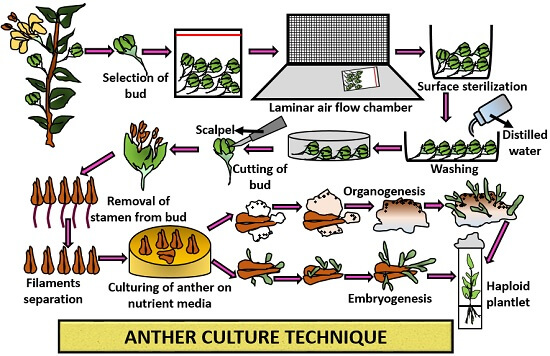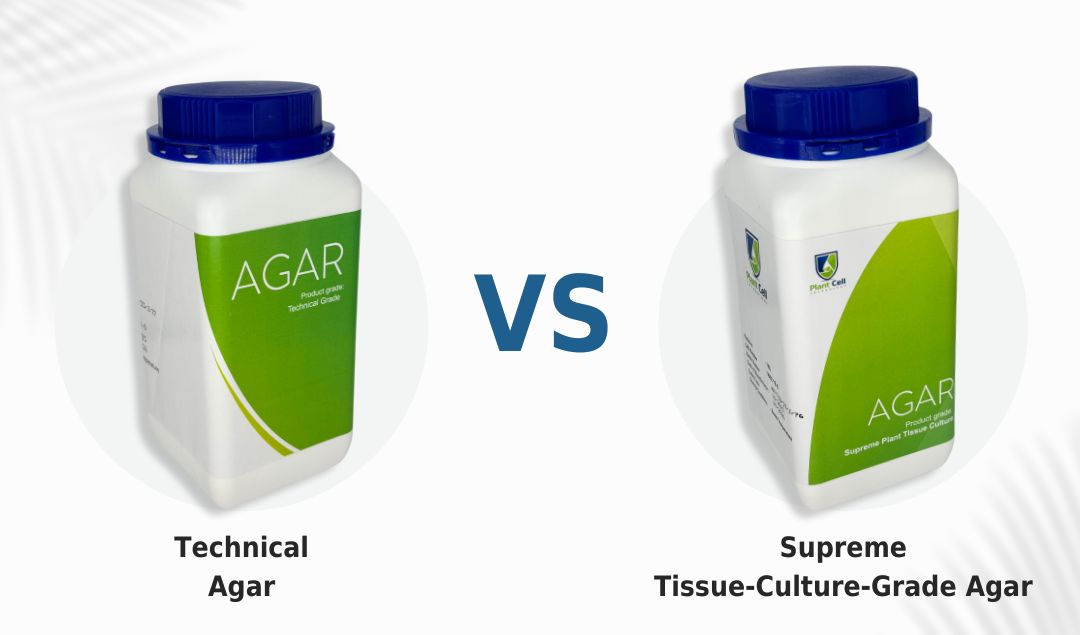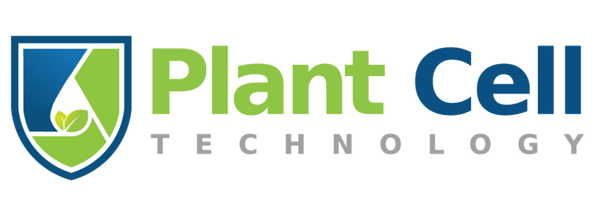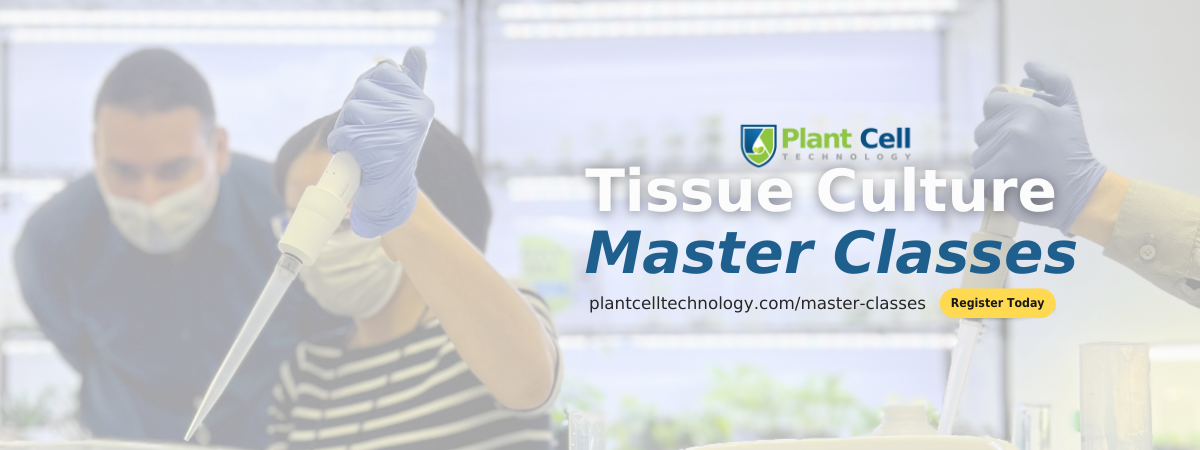
Tissue Culture Explants: Definition, Types, and Sterilization
As a content and community manager, I leverage my expertise in plant biotechnology, passion for tissue culture, and writing skills to create compelling articles, simplifying intricate scientific concepts, and address your inquiries. As a dedicated science communicator, I strive to spark curiosity and foster a love for science in my audience.


What Is an Explant?
If you’ve referred to tissue culture articles, papers, or videos, many times you must have come across the term “explant”.
Explant or a plant explant is a fragment of plant tissue obtained from any part of the plant and used as a starting material to grow a plant in tissue culture. Some examples are leaf section, root fragment, shoot section, and apical buds or seeds.
Do not confuse explant with calli, which is an undifferentiated mass of cells. It’s obtained after an explant or plant tissue is introduced under lab conditions in a culture medium. It gives rise to somatic embryos or shoot buds that form complete plants. It’s also used for the production of primary metabolite by transferring it to liquid media.
Theoretically, all parts of the plants, including the leaf, apical bud, axillar bud, root, anther, ovary, petal, and stem of the plant can be used as an explant to initiate tissue growth in vitro.
It’s mainly because of the totipotency of the plant's tissues.
What is Totipotency?
Totipotency is an ability of a single cell to divide and differentiate into all types of advanced plant cells. They have the ability to regenerate whole organisms. Some factors that affect the totipotency of cells include the cell source, nutrient media, and culture environment.
Some common explants used in tissue culture processes include leaves, stems, meristem, and floral sections. The differentiated tissues such as stem and root sections undergo dedifferentiation (conversion of complex tissues into simple tissues) to regenerate a whole plant in tissue culture.
- Differentiation: It’s a cellular process in which cells form different plant organs, such as shoots, floral, or root tissues.
- Dedifferentiation: It’s the process in which cells start growing in reverse, forming simple tissues from complex ones.
Types of Tissue Culture Techniques Based on Explants
Now you know what is explant and what are some commonly used ones. However, you must know the tissue culture procedures differ a bit based on the type of explant used in the process. This is mainly due to differences in the nature of all explants. For example, the stem is thicker and has harder tissue compared to the leaf section, thus, the sterilization and culturing processes might differ.
Based on the type of explant used, the tissue culture process is of the following types:
- Meristem culture: It’s the process of introducing dome-shaped meristematic tissue (shoot apical meristem or root apical meristem) and auxiliary shoots in nutrient media under controlled lab conditions for the regeneration of a whole plant.

Figure: The schematic representation of meristem culture.
- Seed/ovule culture: The process is mainly used for plants that produce low levels of viable seeds or non-albuminous tiny seeds. Here, a fertilized ovule is placed in a nutrient medium under suitable lab conditions for plant regeneration.
- Embryo culture: It’s the process of isolating and introducing mature or immature embryos under in vitro conditions. The advantage of the technique is that the explant is not damaged during surface sterilization procedures, as whole seed or fruit is sterilized to clean tissues.
- Organ culture: Here, any organ of the plants, such as leaf, stem, or root is used as an explant, cleaned, and introduced in a culture medium under sterile lab conditions. A few methods used to perform organ culture include raft, plasma clot, grid, and agar gel methods.

Figure: A schematic representation of the process of organ culture using different plant tissues.
- Protoplast culture: A cell without a cell wall is known as a protoplast. In tissue culture, it’s generally obtained from a leaf section using mechanical or enzymatic techniques. The procedures used to introduce protoplasts in tissue culture include micro-culture chambers, hanging drop cultures, and soft agar matrix. The technique is mainly used for cell cloning, hybrid and genetically transformed crop formation, and membrane studies.
- Anther culture: In this process, anther is used as an explant for the regeneration of whole plants. It’s mainly used for the production of haploid plants.

Figure: An illustration of the process of anther culture.
- Pollen culture: It’s the process of producing haploid plants by introducing pollen grains under controlled aseptic conditions on artificial nutrient media.
Chemicals Used To Surface Sterilize Explants
Here’re six common surface sterilizing chemicals used for explants:
- Plant Preservative Mixture (PPM): PPM is a broad-spectrum formulation that eliminates all types of contamination in plant tissue culture. Follow the given protocol for surface sterilization of explants:
- Use 5% v/v PPM solution + 3x MS basal ( inorganic ) salts to surface sterilize explants.
- Then gently stir/shake the water-rinsed explants for 4-12 hours and without rinsing place the explants onto the proper medium with 0.1% v/v PPM.
- For seeds, Stir seeds in 4% PPM solution (4ml/96ml water) for 12 hours, after that place in a germination medium containing 0.1%v/v PPM without rinsing.
- Calcium hypochlorite: To sterilize the explant, dissolve calcium hypochlorite in water and filter it before using it. The concentration of the explant used for sterilizing is 3.25%.
- Sodium hypochlorite: It is also known as bleach. It's one of the most commonly used explant sterilizing chemicals. To use bleach in tissue culture, it is diluted to 10-20%, which results in 0.5-1.0% bleach in the final solution.
- Ethanol: The use of ethanol in explant sterilization is widespread, but only a few seconds of exposure is needed since it's highly phytotoxic. Longer exposure times will damage tissues.
- Hydrogen Peroxide: The chemical is also dangerous, so all precautions must be taken when sterilizing the explant. The concentration most commonly used in the process is about 30%.
- Mercuric chloride: To sterilize the explant with this chemical, rinse it many times with sterile distilled water. There shouldn't be any traces on the explant. Take extensive precautions and be careful when handling the chemical. Though because of its highly toxic nature, which is why it's rarely used in labs.
HOW CAN YOU LEARN TISSUE CULTURE AND INCORPORATE IT INTO YOUR PLANT BUSINESS?
We can help!
Seed propagation is an ancient technique and with increasing plant demands, you need a technique that can help you to generate the desired revenue from your business. And, it’s tissue culture.
And, if you are a plant enthusiast or an established business needing help with tissue culture, we’re here!
Plant Cell Technology is a leading company in the tissue culture area. We supply a range of comprehensive solutions and products to ease your tissue culture journey and make your lab more productive than ever.
If you are interested in learning about tissue culture, we have Master Classes curated based on your need. All our classes are designed to train and prepare you to launch your business big and make space for yourself in the ever-expanding plant market. All the classes are led and taught by an experienced instructor of the area, who gives you hand-on-training on the technique, handling plants, and maintaining septic techniques, and teaches you mistakes you should avoid while incorporating the technology into your business.
Interested in our master classes? Check out our upcoming ones on this link!

Furthermore, our store contains a range of products you require to perform your tissue culture experiments, starting from MS media, Agar, PPM™, Plant hormones, and gellan gum. Further, we also provide a unique and simplest bioreactor—The Biocoupler™— for rapid and healthy multiplication of your plants.
If you are stuck in your tissue culture stage and need quick help, we have the consultation you need! Just book your appointment with us and our tissue culture expert will help you with all your queries in a one-on-one video call.
So, if you need anything to grow your plant business using tissue culture, we have everything to streamline and ease your process.
Have any questions for us? Contact us at info@plantcelltechnology.com and we will get back to you to resolve all your queries.
Happy Culturing!!
Blog Categories
View by Level
Popular Blogs

New Technical Agar Vs Supreme Agar
Introduction What’s the secret element that supports and holds plants in vitro? Not sure? It’s the solidifying agent. Solidifying agents...
Read More
Get the Protocol: How to Tissue Culture Nepenthes Using Nodes and Seeds
Introduction This plant is non-vegeterian... ...and we're not kidding! Nepenthes belongs to one of the most interesting families of carnivorous...
Read MoreSubscribe to Our Newsletter








Join the conversation
Your email address will not be published. Required fields are marked